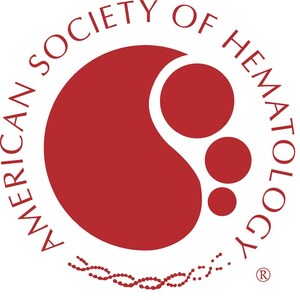WASHINGTON, Dec. 8, 2020 /PRNewswire/ -- In a phase III trial called ASCEMBL, the experimental drug asciminib was nearly twice as effective as a standard-of-care treatment regimen for patients who had recurrent chronic myeloid leukemia (CML) despite two previous courses of tyrosine kinase inhibitors (TKIs). By specifically targeting the myristoyl pocket on the BCR-ABL1 protein, asciminib (known as a STAMP inhibitor) works through a different biological mechanism than existing TKIs, which comprise most available CML treatments.
Five TKI drugs are currently available for treating CML. The disease is typically treated with one of several first-line TKIs; if the cancer persists, another TKI might be used. If both treatments fail or if patients cannot tolerate these options, there are limited alternatives left and patients may face a reduced chance of survival.
"Asciminib may provide a good opportunity for a third-line treatment in CML patients," said senior study author Dr. Andreas Hochhaus, of the University Hospital, Jena, Germany. "The ASCEMBL data show that, with ABL-specific inhibition, asciminib has a reduced rate of side effects that lead to discontinuation or dose adjustment compared to the TKI drug bosutinib, while improving the response rate and speed of response."
The researchers enrolled 233 patients with Philadelphia chromosome (Ph)-positive chronic myeloid leukemia in chronic phase (CML-CP) who had been previously treated with two or more TKIs. Participants were randomly assigned to receive asciminib (157 patients) or bosutinib (76 patients) as third-line treatment and followed for a median of just under 15 months.
At 24 weeks, 25.5% of those receiving asciminib achieved a major molecular response (MMR, an indicator that cancer cells have been reduced to extremely low levels), compared with 13.2% among those receiving bosutinib, meeting the trial's primary endpoint. Those taking asciminib were also twice as likely to achieve a deep molecular response, an indicator of more thorough eradication of cancer cells.
Adverse events of grade 3 or higher occurred in about half of patients taking asciminib and 60% of those taking bosutinib. "The tolerability profile was very good," said Dr. Hochhaus. "It offers a nice proof that the more specific an inhibitor is, the fewer side effects you see."
Submission to the U.S. Food and Drug Administration and the European Medicines Agency of the European Union is planned for 2021. Additional trials are ongoing. This study was funded by Novartis.
Dr. Andreas Hochhaus, of the University Hospital, Jena, Germany, will present this study during the Late-Breaking Abstracts session on Tuesday, December 8 at 7:30 a.m. Pacific time on the ASH annual meeting virtual platform.
For the complete annual meeting program and abstracts, visit www.hematology.org/annual-meeting. Follow ASH and #ASH20 on Twitter, Instagram, LinkedIn, and Facebook for the most up-to-date information about the 2020 ASH Annual Meeting.
The American Society of Hematology (ASH) (www.hematology.org) is the world's largest professional society of hematologists dedicated to furthering the understanding, diagnosis, treatment, and prevention of disorders affecting the blood. For more than 60 years, the Society has led the development of hematology as a discipline by promoting research, patient care, education, training, and advocacy in hematology. ASH publishes Blood (www.bloodjournal.org), the most cited peer-reviewed publication in the field, and Blood Advances (www.bloodadvances.org), an online, peer-reviewed open-access journal.
SOURCE American Society of Hematology

Related Links
WANT YOUR COMPANY'S NEWS FEATURED ON PRNEWSWIRE.COM?
Newsrooms &
Influencers
Digital Media
Outlets
Journalists
Opted In





Share this article